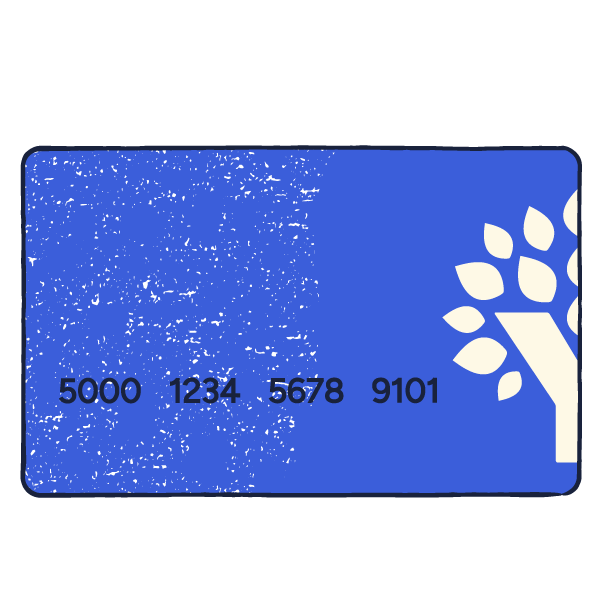How YNAB Is Like a Smart Gift Card

We've all experienced that exhilarating moment when you reach into your wallet and pull out a gift card, right? It's like holding a little slice of financial freedom in your hands. The possibilities are endless, and there's an undeniable sense of joy knowing that you can indulge guilt-free in your favorite coffee shop, splurge on a new book, or treat yourself to a much-needed spa day—all thanks to that magical piece of plastic.
But what if I told you there's a way to capture that same feeling of liberation with every dollar you earn? Imagine having the power to allocate your money like a stack of personalized gift cards, each one designated for a specific purpose, without the fear of overspending or losing track of your finances. Welp, that's YNAB's Rule One in a nutshell.
When you follow Rule One: Give Every Dollar a Job, you divide your money up into specific categories, like little digital envelopes for your dollars. So let’s say you set aside $50 in an entertainment category. When you take your kids to the bowling alley, you spend the money out of your entertainment bucket. Isn’t that a lot like using a gift card? With YNAB, your spending is limited to a specific purpose. With a gift card, it’s limited to a specific store.
And there are a lot of benefits to this. Gift cards give you crystal-clear clarity, healthy limits, and freedom to spend without guilt. YNAB lets you experience all of these perks—with none of the drawbacks. Let me break it down for you.
Gift Cards and YNAB Give You Instant Clarity
Let’s talk about an economic term that describes why money is useful. Before your eyes gloss over, I promise this will be fun, because we’re talking about fungibility. (FUNgibility. Not FUNGIbility.)
Fungibility refers to a good or asset that can be exchanged for another of the same type. When it refers to money, it means any dollar is just as valuable as any other dollar. They’re the same. If you ask any economist why money is so useful, they’ll probably talk about fungibility. Because one dollar is exactly as valuable as any other, we can use them to make the exchange of goods and services much, much easier.
So fungibility is a great thing, but it also makes it more difficult to make spending decisions. You can use $100 to buy ANYTHING worth $100. It’s easy to become paralyzed by choices, because there are so many possibilities. What’s nice about a gift card is it removes the fungibility. Instead of a giant wad of cash that can be spent on literally anything, you’re holding a smaller amount for something very specific. If you have a gift card to a local massage parlor, you instantly know you’re going to spend it on a massage. No second guessing.

This is why we like to get people gift cards instead of just giving them cash. When you buy someone a gift card, not only are you giving them money, but you’re taking away the burden of deciding how they should spend that money. That is exactly why it feels better to buy a gift card for someone’s birthday present rather than just giving them cash. It’s also why a gift card to a local restaurant feels more thoughtful than a gift card to Amazon. An Amazon gift card is almost as fungible as cash, because they sell everything. But a gift card for something more specific shows you were more thoughtful.
Using YNAB gives you the same clarity for all of your spending. When you allocate $500 to your grocery category, it is kind of like buying yourself a $500 gift card to the grocery store. You no longer have to make any decisions about that $500. You know you’re going to spend it on groceries.
Gift Cards and YNAB Help You Set Spending Limits
That brings up another benefit of gift cards that YNAB replicates perfectly. Gift cards also help you set a spending limit.
Going back to our $500 grocery category—now, when you pick up some groceries, you can look at your grocery category to determine how much you can spend. It’s no longer an amorphous checking account balance that can be spent on literally anything. Not only do you have clarity on how you’re going to spend that $500, but you have clarity on how much you have left to spend.
This dynamic is exactly why Starbucks is (very arguably) one of the largest banks in the world. As of April 2023, their wildly popular rewards program held $1.8 billion (with a B) in cash, either in gift cards or in app deposits. That’s wild, you all! Why are so many people willing to fork over so much money to Starbucks before they actually buy coffee?
Because without YNAB, this is one of the only tools people have to plan their spending. Starbucks customers load money in their app or buy gift cards in large part so they can decide and enforce a certain amount of spending on coffee within a particular time period. That’s another huge benefit of gift cards. They help you limit your spending.
YNAB fulfills this need perfectly without having to give an interest-free loan to one of the largest corporations in the world. How much do I have left to spend on coffee? Just check the coffee category. (Oh, and now you don’t have to buy your coffee only at Starbucks!)
Gift Cards and YNAB Remove the Guilt from Spending
Another reason we give gift cards is to lovingly force someone to spend money on something in particular. When you buy someone a gift card, you’re giving them the gift of paying for something, but you’re also giving them the gift of permission to treat themselves. You’re taking away the guilt associated with spending on something they might think is frivolous.
That’s why it’s such a pleasure to give a gift card to a particularly selfless person. You know your mom loves pedicures, but she never wants to spend money on herself. If you buy her a gift card for a pedicure, you make sure she’ll spend it on something she enjoys.

So when you set money aside in a fun spending category in YNAB, you’re giving yourself the same gift. When you plan your fun spending right alongside your bills and non-monthly expenses, you can see that you can spend money on something fun without worrying about any other obligations. Assign the money on paper first, and you can spend freely without guilt, shame, or worry.
Gift Cards Aren’t Flexible, But YNAB Is
Gift cards bring a whole lot of value to our life, but they do have a major drawback. They aren’t flexible. Have you ever had a gift card to one store and really wish you could use that money somewhere else? Maybe you’ve even wished you could convert a gift card to cash so you could spend it on whatever you want. Remember, gift cards remove some of the fungibility of money. That brings all of the benefits we’ve talked about, but at the cost of flexibility.
But with YNAB, you don’t have that cost because of Rule Three: Roll With the Punches. A core part of the YNAB Method is that you can change your money plan at any time for any reason. The money in your YNAB categories is still money after all, and that means it’s still fungible.
If a friend invites you to go out to eat unexpectedly but your dining out category is depleted, you can move some money from your vacation category to cover it. If you overspend on a spa gift card for your mom, you can swipe some cash from your entertainment category. No problem, no fuss. So long as you weigh the tradeoffs, you can change your plan whenever you want.
That means that while YNAB gives you gift-card clarity, gift-card limits, and gift-card freedom to spend, it also gives you cold-hard-cash flexibility. It’s all of the benefits, but none of the drawbacks.
Do you want gift-card clarity for all of your money? Try YNAB today. It’s free for 34 days and it might just change your life.

.png)






.jpg)




